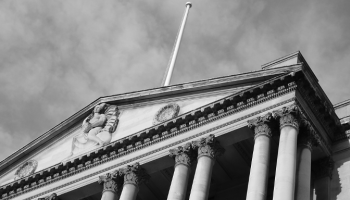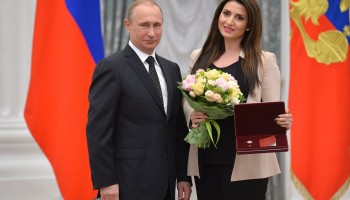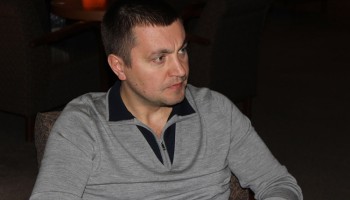Between 2013 and 2015, more than US$ 13 million in dirty money from a giant Russia- centered money laundering scheme, dubbed the Russian Laundromat, flowed back into Moldova to buy shares in the country’s largest bank, Moldova Agroindbank (MAIB).
The Russian Laundromat, uncovered by reporters from OCCRP and its partners RISE Romania and RISE Moldova, is one of Eastern Europe’s biggest-ever money-laundering operations. An estimated US$ 20 billion was siphoned out of Russia between 2010 and 2014 with the connivance of corrupt Moldovan judges before disappearing into the European Union through complicit banks in Latvia.
Prosecutors around the world have been working to trace the money. Reporters for RISE Moldova found some of it close to home.
Moldovan prosecutors, assembling evidence on Laundromat transactions for future trials, concluded that at least US$13 million of the proceeds came back to Moldova through various offshore corporations. Reporters at RISE Moldova looked at several of the transaction chains to better understand how the system worked.
Azyol Development Ltd., based in Cyprus, is one of the companies that received money from the Laundromat operation. At the beginning of 2016, Azyol owned 4 percent of MAIB shares, buying them in two installments in 2013 and 2014 for about US$ 3.54 million.
Banking regulators canceled Azyol’s shares earlier this year after discovering that Azyol had acted in concert with other shareholders to amass 39.5 percent of MAIB. All of the shareholders purchased MAIB shares without the permission of the regulator, the Moldovan National Bank (MNB).
[Moldovan law requires that anyone owning more than one percent of a bank’s share capital be identified and approved by the MNB].
The money that went to Azyol followed a complicated route through at least six other offshore companies, which RISE Moldova was able to trace.
The voyage began with a Moldovan court bailiff named Svetlana Mocan, who deposited money from Russian companies to her bailiff’s account at Moldindconbank. Such accounts are used for court-related transactions such as judgments, fees and settlements.
The money came from fraudulent court decisions, in which bribed Moldovan judges ruled that Russian companies and Moldovan citizens must pay debts to offshore corporations. In reality, the debts were phony and the ruse simply allowed Russian criminals to launder and move stolen money out of their country. The court rulings allowed them to account for the origin of the money.
In a typical money laundering system, a large block of money to be laundered by individual groups is pooled together and then sent through a series of paper companies, all of which are controlled by the money launderers with the goal of obscuring the origin of the money. The transactions are supported by fake paperwork purporting to be legitimate trades. The launderers then wire back the money from the fake companies to the original owner of the money.
In Azyol’s case, the money was transferred from Moldova to offshore companies registered in the United Kingdom (UK) that were part of the Laundromat. After several more transactions between foreign companies, the money ended up in the Latvian account of Azyol Development Ltd., which then bought shares of MAIB.
Another company, more laundered money
Moldovan law enforcement says another MAIB shareholder, a Latvian company named Dilnoro Group SIA, also received money from the Laundromat. Dilnoro is represented by a Ukrainian citizen, Anatolii Mykosianchyk.
Dilnoro’s money hopscotched between banking institutions in different countries at dizzying speeds. The initial amount of US$ 967,000 increased to US$ 988,000 during the course of its travels, though it is not clear why.
On March 13, 2013, bailiff Mocan deposited 736.5 million Russian rubles (about US$ 23.9 million at the exchange rate at the time) from the accounts of three Russian correspondent banks into her official account at Moldindconbank. The transfer was authorized by judges in Chisinau’s Central District and Riscani District courts as part of the scam.
Of this amount, Mocan converted 29.8 million rubles into US$ 967,000 and transferred the money to bank accounts maintained by Westburn Enterprises Ltd. at the Latvian bank Trasta Komercbanka. The money then began bouncing around Latvian accounts belonging to different companies.
The next day, Westburn transferred US$ 974,000 to the account of Denison Ltd., which in its turn transferred US$ 988,000 to Caldon Holdings Ltd. Prosecutors say all three companies are involved in the Russian Laundromat.
Later that same day, Caldon transferred US$ 988,000 to Dilnoro, identified as “payment for construction materials.” In reality, investigators say, the money was used to buy shares of MAIB.
On March 18, 2013, Dilnoro Group bought 4,093 shares of MAIB (representing 0.4 percent of equity), paying 4.4 million lei (US$ 337,000 at that time).
Dilnoro’s banking statement also states that the money was “payment for construction materials.” But Moldovan investigators say that the money was in fact used to buy MAIB shares, and that after additional transactions, Dilnoro spent nearly US$ 1 million to buy into the bank in March 2013.
On March 22 of that year, alarmed by the suspicious transactions, the National Commission of Financial Market (NCFM) suspended the consortium’s MAIB shares transactions. Dilnoro later sold some of its shares to a British offshore, Hessond Solution Ltd., which also received Laundromat money. The two became part of a consortium of companies that by March of 2016 had amassed nearly 40 percent of MAIB shares.
As of July 11, 2016, Dilnoro still owns 0.39 percent of MAIB, while Hessond, like other members of the consortium, was ordered to divest its 4.49 percent of the bank, according to official MAIB documents. It is unclear why Dilnoro was allowed to keep its stake in MAIB.
Delaware-based Felina Investments is another company heavily involved in the Laundromat that invested in MAIB. Investigators say Felina is under investigation in connection with US$ 400 million allegedly laundered via another Moldovan bank, Moldindconbank.
On April 16, 2015, Felina lent US$ 819,000 to a British company, Tush Enterprises Ltd.; on that same day, Tush acquired 0.9 percent of MAIB.
Felina is connected to a former Moldovan politician, Veaceslav Platon, who is believed to be one of the main actors in the current Moldovan banking wars. Platon was arrested last week in Kyiv and Moldovan prosecutors are seeking his extradition.
Viorel Morari, the chief of Moldova’s Anticorruption Prosecutor's Office, said Platon is being investigated in two criminal cases dating from 2015. The first involves charges of money laundering in large amounts, while the second involves allegations of fraud.
He was arrested on July 25 by the Ukrainian secret service after he was put on an international watch list by Moldovan police. On July 28, a Ukrainian court ordered Platon detained for 40 days.
Tush Enterprises Ltd. was established in the United Kingdom in 2014 by a former Ukrainian policeman, Ivan Liubymov. Liubymov, 38, who lives in Kyiv, met with RISE reporters in March 2016. He refused to say who is the real (beneficial) owner of Tush Enterprises.
“I know nothing. You have all the documents. What do you need from me?” asked the former policeman. “Send requests by mail and I will consult with my lawyers, then I will respond.
“I do not own any company ... I am not involved in any criminal activity, and I am not obliged to say anything.”






